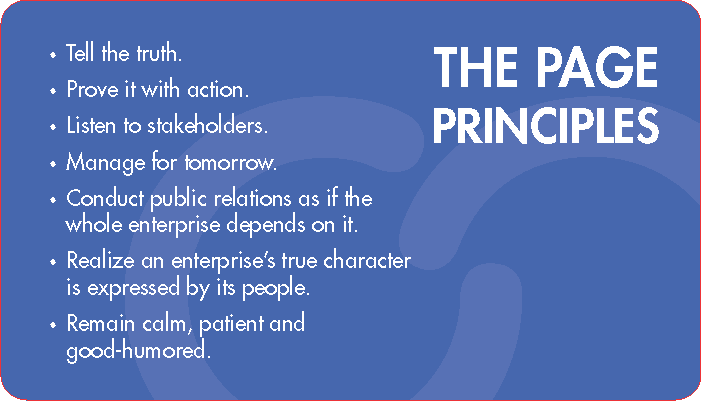Page has evolved significantly over the past 40 years but we still believe that the Principles our founders compiled in service of our mission hold very true today.
They developed the Page Principles on the basis of the lifetime of work of Arthur W. Page, including speeches and writings. While Page did not write them himself, our founders believed it was important to capture, honor and promote the tenets by which he practiced public relations. Page members regard these principles as the guidelines by which they, and indeed all communications professionals, should undertake their role. Watch this video of Page President, Roger Bolton sharing what the Page Principles mean, and see how these principles continue to guide what we do in our reports.

Page Principles 1:
Let the public know what's happening with honest and good intention; provide an ethically accurate picture of the enterprise's character, values, ideals and actions.
Page Principles 2:
Public perception of an enterprise is determined 90 percent by what it does and 10 percent by what it says.
Page Principles 3:
To serve the enterprise well, understand what the public wants and needs and advocate for engagement with all stakeholders. Keep top decision makers and other employees informed about stakeholder reaction to the enterprise's products, policies and practices. To listen effectively, engage a diverse range of stakeholders through inclusive dialogue.
Page Principles 4:
Anticipate public reaction and eliminate practices that create difficulties. Generate goodwill.
Page Principles 5:
No strategy should be implemented without considering its impact on stakeholders. As a management and policymaking function, public relations should encourage the enterprise's decision making, policies and actions to consider its stakeholders' diverse range of views, values, experience, expectations and aspirations.
Page Principles 6:
The strongest opinions — good or bad — about an enterprise are shaped by the words and deeds of an increasingly diverse workforce. As a result, every employee — active or retired — is involved with public relations. It is the responsibility of corporate communications to advocate for respect, diversity and inclusion in the workforce and to support each employee's capability and desire to be an honest, knowledgeable ambassador to customers, friends, shareowners and public officials.
Page Principles 7:
Lay the groundwork for public relations successes with consistent and reasoned attention to information and stakeholders. When a crisis arises, remember, cool heads communicate best.